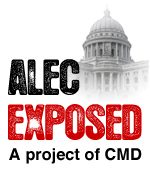Senator Grothman Tries to Mask WI Campaign Contributors
 A bill moving through the Wisconsin Legislature would make it more difficult to track and accurately tabulate campaign donations from businesses and industries in state elections. Critics say it could also hinder investigations of illegal campaign fundraising like the one that resulted in the conviction of a Wisconsin railroad executive last year and others that could be part of the current "John Doe" investigation into Governor Scott Walker's staff.
A bill moving through the Wisconsin Legislature would make it more difficult to track and accurately tabulate campaign donations from businesses and industries in state elections. Critics say it could also hinder investigations of illegal campaign fundraising like the one that resulted in the conviction of a Wisconsin railroad executive last year and others that could be part of the current "John Doe" investigation into Governor Scott Walker's staff.
As Governor Walker sets a pace to collect more campaign money, from more corners of the country, than any candidate in Wisconsin history, State Senator Glenn Grothman (R-West Bend) is sponsoring Senate Bill 292 to no longer require that individuals donating to political campaigns disclose their employer. Current law requires that all donations of $100 or more include the donor's occupation and employer so that organized streams of special interest money to candidates can be identified and made transparent.

 MONTPELIER, Vermont — You can't see them. They're hidden from view and probably always will be. But the health insurance industry's big guns are in place and pointed directly at the citizens of Vermont.
MONTPELIER, Vermont — You can't see them. They're hidden from view and probably always will be. But the health insurance industry's big guns are in place and pointed directly at the citizens of Vermont. These documents reveal a string of money going from Syngenta to pundits, economists, scientists, and others. Below is a sample of some of the "third party" surrogates who have been financially supported by Syngenta.
These documents reveal a string of money going from Syngenta to pundits, economists, scientists, and others. Below is a sample of some of the "third party" surrogates who have been financially supported by Syngenta. Little is known about the agenda of the ALEC education meeting taking place at the Ritz Carlton on Amelia Island. The meeting is not open to the public and recently even
Little is known about the agenda of the ALEC education meeting taking place at the Ritz Carlton on Amelia Island. The meeting is not open to the public and recently even  In his State of the Union address, President Obama said very little about health care reform, but what he did say was a reminder of how tight a grip the insurance industry has on the U.S. health care system -- and will continue to have if the Affordable Care Act is not implemented as Congress intended. And it is largely up to the President to make sure that it is.
In his State of the Union address, President Obama said very little about health care reform, but what he did say was a reminder of how tight a grip the insurance industry has on the U.S. health care system -- and will continue to have if the Affordable Care Act is not implemented as Congress intended. And it is largely up to the President to make sure that it is.